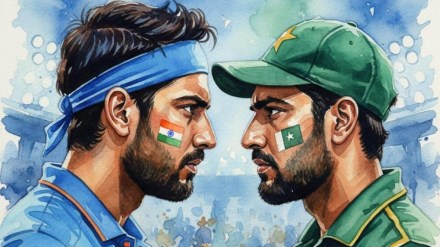“Serious sport has nothing to do with fair play. It is bound up with hatred, jealousy, boastfulness, disregard for all rules and sadistic pleasure in witnessing violence: in other words, it is war without bullets.“
~ George Orwell, The Sporting Spirit, 1945
Eight decades later, his words feel uncannily alive as India and Pakistan prepare to meet in Dubai for their first-ever Asia Cup final.
The story of this tournament was never just about runs or wickets. It has been a tournament where the smallest actions have carried outsized meaning. A look, a gesture, or a word has been turned into a statement. Fans have swayed between calls for boycott and an almost obsessive following, while broadcasters have packaged the tension as theatre. Two nations now arrive at a night weighed down by history, carrying far more than just cricket on their shoulders.
Power of Gestures
Long before the first ball was bowled, the unease was plain to see. India refused to shake hands at the toss. In the days that followed, batters and bowlers fought not only with skill but with signals, celebrations, and pointed words. A raised finger, a mime of gunfire, the gesture of planes being shot down, a post-match dedication to soldiers. None of it was random. Every act was read as commentary on something larger than cricket. The ICC’s hearings and fines were not about discipline. They were proof of how far the contest had drifted from the comfort of sport into the battlefield of meaning.
Rivalry Rewritten
India’s string of victories allowed their captain to brush aside the very notion of a rivalry. For him, a lopsided record made the contest too one-sided to matter. Yet Pakistan refused to accept that narrative. They held onto the final as their answer, a chance to remind the world that form and statistics collapse when these two sides meet. Rivalries do not die with statistics. They live in memory and feeling. No matter what anyone says, when these two face off, it never feels like anything else matters.
Forty-One Years of Absence
It is extraordinary that in the Asia Cup’s 41-year history, these two giants never shared a final until now. In the early years, they were the only two serious ODI powers, yet boycotts, border conflicts, and cancellations always interfered. India skipped 1986, Pakistan skipped 1990, the 1993 tournament never happened. In 2025, despite politics being just as heated, broadcasters have delivered the pairing the tournament had always threatened to become. For them, this was the holy grail, and finally they have it.
The Audience That Can’t Look Away
If politics shaped the rivalry, the crowd has been guilty of shaping its theatre. Before the first game, protests rang out, hashtags trended, and tickets went unsold. People claimed they wanted no part of it. Yet those same fans dissected every non-handshake, every glance, every muttered word. By the second clash, the mood had flipped. Profanities on live television were celebrated as patriotic spirit, and complaints shifted to too many advertisements interrupting the action. Now, for the final, boycotts have turned into box office. PVR INOX is screening the game in theatres across India, tickets snapped up like a blockbuster film. It recalls Ramadhir Singh’s line from Gangs of Wasseypur about cinema making fools of everyone. Replace cinema with cricket, and the prophecy is complete. No matter the outrage, no one can resist watching.
Shadow of Defeat
This is where the contest sharpens. In all international finals across formats, Pakistan hold the edge over India by seven wins to three. Since 1998, India has beaten Pakistan in just one final, the 2007 T20 World Cup. Pakistan, by contrast, has won all their finals against India in ODIs. And yet, India arrive tonight carrying the aura of their new era. Since lifting the 2024 T20 World Cup, they have won 35 of their last 38 T20 internationals, even clutching victories out of tied games through nerveless Super Overs.
But knockout games against Pakistan are not decided by form alone. History remembers 1996, when Pakistan’s World Cup defeat to India in Bengaluru sparked a chain of tragedies. TV screens were smashed in anger, Wasim Akram was met with threats, and religious voices declared the team cursed under the rule of a female Prime Minister. In one of the darkest moments, a young fan, unable to bear the defeat, turned his gun first on his television and then on himself. By the time the team’s plane touched down, it had to be diverted away from Lahore, where furious crowds waited with banners of abuse and hands full of rotten eggs. That was before social media. Today’s players know that a single mistake could ignite storms that spread faster, louder, and crueller than anything from the past.
The Night Ahead
When the players step onto the field in Dubai on Sunday, they will be carrying far more than the chase for silverware. They will be carrying decades of history, the weight of expectation, and the scrutiny of millions who can neither stay away nor watch calmly. For one side, the night will end in relief and glory. For the other, it will stretch endlessly, long after the lights in Dubai are switched off, long after the last replay has ended, long after the world has moved on.
Because in this final, triumph will be celebrated in headlines, but the pain of losing will haunt in silence, heavier than the roar of any crowd.
